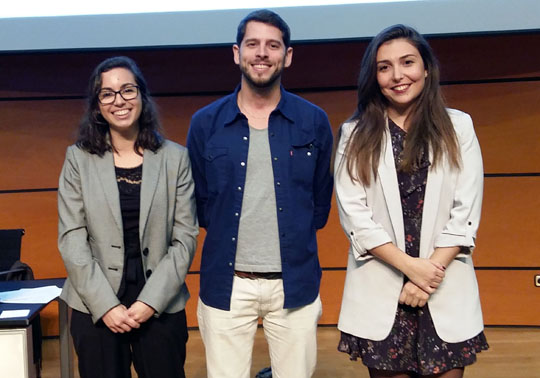Users
Social media
- More details here...
- Address
Parc Científic de la Universitat de València C/
Catedrático Agustín Escardino, 9
46980 Paterna (Valencia) Spain - Email:
iu.i2sysbio@uv.es - Phone:
(+34) 963544810
- Address
Links
Research on biological clocks wins the First Thesis Dissemination Conference of the University of Valencia

Investigation & Education
Research on biological clocks wins the First Thesis Dissemination Conference of the University of Valencia

The researcher at the Institute of Integrative Systems Biology (I2SysBio) Jorge Mariano Collantes has been the winner of the First Dissemination Day of Doctoral Theses of the University of Valencia, convened to publicize the research of the doctoral students of the academic institution. At the event, today in the Joan Plaça Auditorium of the Jardí Botànic, each of the 21 selected theses was defended in 3 minutes. The prize is a stay at Harvard University valued at €2,000.
The second prize (€500) went to Marta Reguera, from the Faculty of Pharmacy, with the exhibition “Urinary Schistosomiasis: a tropical disease knocking on the doors of Europe”. The third, out of 300, went to Mónica Martínez López-Sáez, from the Faculty of Law, with "The guarantee of the Right to be Forgotten: data protection, future challenges and proposals for regulating situations of vulnerability in the European Union."
"The doctorate is the highest degree that can be obtained at the university. It contributes a lot to those who do it, but it also contributes quality to the institution and is a way of transferring the knowledge generated. This day contributes to the dissemination of knowledge in society Valencian”, highlighted Mavi Mestre, rector of the University of Valencia. For his part, the director of the Doctoral School, José Vicente Bagán, has highlighted "the high scientific level of the theses presented, which is a source of pride for the university community."
"My work deals with the functioning of biological clocks and what genes are involved in them. How organisms understand the time, the season or the cycles to regulate themselves," declared Jorge Mariano Collantes (Corrientes, Artgentina, 1986). The researcher, who has been working on this topic for seven years and was a finalist in the FameLab science dissemination contest in 2015, has highlighted that he likes scientific dissemination and has asked for more activities of this type to be carried out.
The session has been organized by the Doctoral School and the Scientific Culture and Innovation Unit of the University of Valencia and has the collaboration of the Polibienestar Institute. The vice-rector for Internationalization and Cooperation, Carles Padilla, also attended the event, who presented the awards; and María Dolores Real, vice-rector for Innovation and Transfer.
At the event, Pere Estupinyà, scientific communicator and writer, gave the conference “From the academy to scientific communication: a professional experience”, in which he explained the need to make the scientific message more flexible and adapt it to the format and the public. “Some scientists are not able to do it.” The disseminator has also addressed the doctoral students present at the event, proposing that they be proactive and proactive, and has cited himself as an example, his participation in television programs such as Redes, the books he has written and his constant updating.
For his part, Martí Domínguez, director of the magazine Mètode, has given the conference “The Repte de divulgar”. In his historical review of dissemination, he has recalled the figures of Galileo, Newton, Darwin and Einstein, until reaching the 20th century. The professor of Journalism at the University of Valencia has also discussed the “conflict” between the scientific and journalistic fields, and its current episodes, with media without specialized journalists, to give an example; or institutions with personnel who do not make an effort to disclose.
The jury was formed by José Vicente Bagán; the researcher of the Department of Language Theory and Communication Sciences Bejamín Marín; Carmen Agustí, researcher in the department of Cellular Biology, Functional Biology and Physical Anthropology; Lucía Sapiña, doctoral student at the University; and Pere Estupinyà.
The criteria for evaluating the best works have been the content of the exhibition (research interest, expository clarity of objectives and methodology, 4 points); creativity and originality in the form of speech (structure, intonation, speed of speech, eye contact with the audience, with up to 3 points) and the use of simple language, correct use of syntax and non-sexist language (3 points). encrypted-media; frameborder="0" height="408" scrolling="no" src="https://www.youtube.com/embed/Q3EHgHCyKjw" width="100%">



